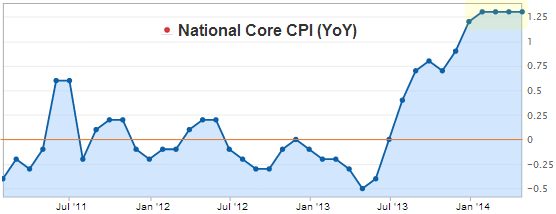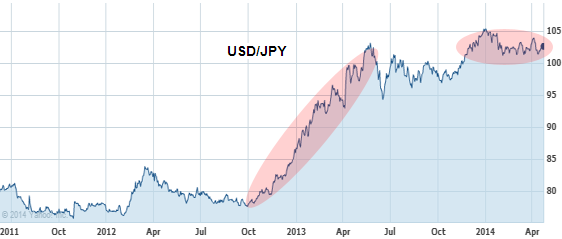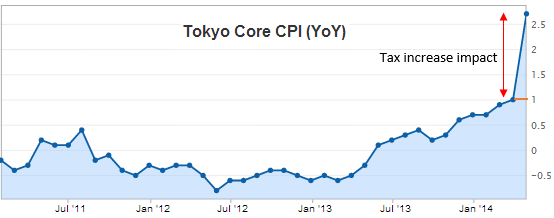Today's inflation report in Japan shows that further significant progress toward the 2% target rate remains elusive. Analysts have been focused on the Tokyo CPI figure, which is reported a month ahead of the national number. The Tokyo result is the first post-consumption-tax-hike inflation indicator and provides a preview for how the nation is impacted by this increase. As expected, there was a spike in Tokyo prices.
But according to the Bank of Japan estimates, the tax increase should have raised inflation by 1.7% in April. That puts the Tokyo tax-adjusted measure at 1% - unchanged from the previous month and below expectations. Some were hoping that a larger portion of the tax increase would flow through to the consumer, but it seems that Japan's companies simply lack the pricing power.
At the national level (through March), the core inflation seems to be stuck at 1.3%. If the Tokyo measure is any indication, the April increase nationally will be mostly tax driven - and therefore temporary.

Japan needs to break through this CPI "ceiling" in order to comfortably move away from the deflation danger zone. However much of the inflation increase last year has been due to weaker Yen. But now that the yen has stabilized, the currency-related impact on prices is dissipating.

Should Japan attempt to weaken the yen even further in order to move inflation higher? The problem with that approach is that it would exacerbate the "wrong" type of inflation. Over the past year in Japan, dairy products are up 4%, meats are up 5%, gasoline is up 6%, and electricity is up 10%. These are import driven price shocks and further yen weakness could spell trouble.
With wage growth remaining inadequate, the new consumption tax combined with these price increases could put severe pressure on the consumer. That makes further yen depreciation a difficult policy to embrace. Some however would argue that all the export growth created by weaker yen would more than offset these domestic issues. Making Japanese goods cheaper should result in better sales abroad (as it did in the past), more profits domestically, better economic growth, etc. The impact of the latest yen devaluation on exports however has been less than stellar - certainly not enough to offset these domestic price shocks. In fact, Japan's trade balance is now firmly in the red (see chart).
To be sure, currency weakness has helped Japan achieve a higher inflation rate, but at a significant cost. Further currency weakness could exacerbate the situation without necessarily boosting exports. Moreover, it is not clear how sustainable the price increases will be going forward, particularly in the event of consumer retrenchment. On the other hand, as the currency stabilizes and inflation stalls, it will become increasingly difficult to reach the 2% target rate.

